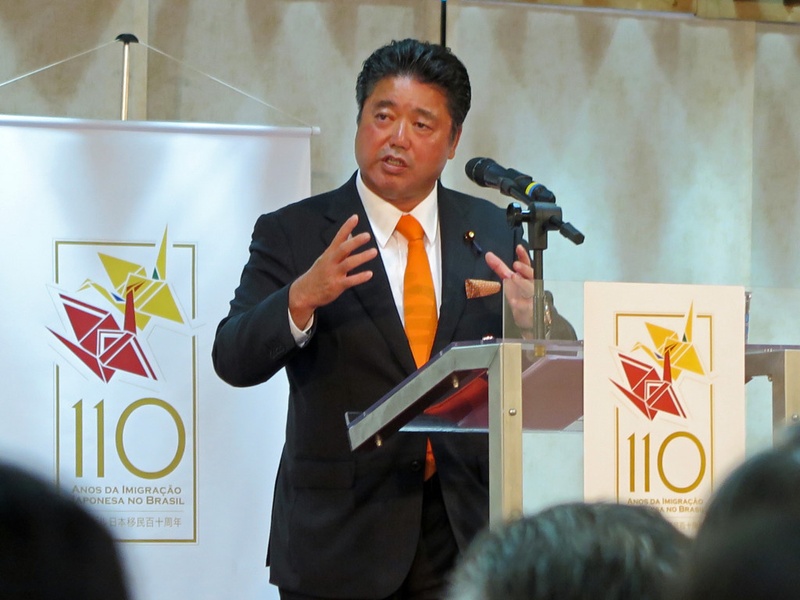Why are they stricter on Japanese people but more lenient on other foreign workers?
[Nagai] Also, in 1990 and 1995 when Professor Patricia went, the difference in GDP per capita between Japan and Brazil was about 10 times, so if you worked in Japan for a few years, you could buy an apartment here, buy a car, or open a company. That's why it made sense to go to dekasegi.
However, recently the gap has narrowed to about 3 to 4 times. It fluctuates every year due to the Brazilian recession and exchange rates, but it is shrinking.
So even if you go alone and work for a few years, you won't be able to do anything here. Real estate here has also become expensive. That's why there aren't many people going to dekasegi these days. Rather, there are more and more people going to Japan to meet the demand for "immigrating with their families."
[Fukazawa] What kind of cases are there when a family wants to emigrate to Japan?
[Nagai] In other words, it's not like "I'll go alone, work, and send money over here," but rather, "We'll all go together and live over there, and we'll never come back."
In reality, I think there are some people who say they want to come back in a few years, but I think more and more people are going with that intention when they go.
[Fukazawa] Mr. Nagai, in that sense, if the current fourth-generation visa system remains in place, it will not solve the fourth-generation problem.
[Nagai] The fact that only single people can go is different from the current trend of people who want to go.
[Fukazawa] On the other hand, Japan's Abe administration has announced a "solid policy" to accept 500,000 foreign workers...
[Nagai] Well, if you look at the requirements of that "basic policy," there are some parts that are more lenient than the fourth generation visa (laughs). So, I think it would have been better if they had been more lenient in accepting fourth generation immigrants.
[Fukazawa] There's something inconsistent about it. They say things like, "Japanese people are Japan's treasure."
[Nagai] It's more like the fourth-generation visa is serving as a test case for accepting foreign workers.
[Fukazawa] I don't really understand why we have to base it on the Working Holiday (WH). There is the "special residence visa" that has been given to the third generation, so why suddenly go in a completely different direction?
[Nagai] Moreover, even though WHs don't actually need supporters, it is a requirement for fourth-generation visas.
[Fukazawa] That's right. It doesn't matter.
[Shimano] It's not like you're experiencing the culture of "tourism while working." The fourth generation visa seems a bit out of place.
[Nagai] If it was a real working holiday (WH), that would have been fine. But it's off the mark. There's a "5-year limit" and "you need a supporter." Someone has to be the supporter.
The original role of the supporter system is to support people's life in Japan, but there is a possibility that it could tie them to their workplace. For example, a company employee may become a supporter and say, "If you quit your job, I'll stop being a supporter."
This means that there is a possibility that this role will end up tying people to jobs such as nursing care, which are relatively tough and low-paying, and where Brazilians, who are free to change jobs, would not normally take.
[Fukazawa] Mr. Shimoji said something like, "If all employees in a company of 50 people become supporters, we can accept up to 100 people." In other words, each supporter can take on up to two fourth generation members. If the entire company becomes a supporter, "changing companies" means "changing supporters," right?
The council member said, "It's okay to change supporters," but can the change be made smoothly? Well, you never know until you try.
There is a possibility that a gap will emerge among foreigners in Japan between those who are free to change jobs and those who are tied down because of the support they receive.
[Nagai] That's right. If people are tied to their workplaces and cannot change jobs freely, disparities could emerge among Brazilians based on their residence status.
It seems that if I marry another Brazilian or a Japanese person, I can change my status of residence. Unless I do that, I will be tied down to my workplace. I'm worried that something unfortunate will happen to me.
Officially, the role of a supporter is to keep an eye out to make sure no bad behavior emerges, and there is a rule that they cannot be tied down to the workplace.
[Fukazawa] Even before that, it seems like it would be realistically difficult to find supporters.
[Nagai] In the end, the people who find supporters end up being the same people who hire people, and then problems might arise like not being able to change jobs.
Continued >>
*This article is reprinted from the Nikkei Shimbun ( August 24th and 28th , 2018).
© 2018 Masayuki Fukasawa / Nikkey Shimbun







